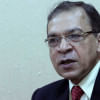Bede girls being robbed of their childhood

We are quite shocked to learn about the alarming rate of child marriage among the Bede people living on the bank of Savar's Bangshi river. According to a report by this daily, a majority of the girls from this community are married off before they can reach 15 years of age, and by 18 most have about two or three children. Life is hard for this community, especially girls who, robbed of their childhood, have to search for a livelihood at a young age but still cannot earn enough to ensure proper meals for their family. In the absence of any support or income-generating activities, they often resort to begging.
One such girl is 16-year-old Shohagi, who was married off at the age of 10 to a boy only two years her senior. By the time she has turned 16, she has become the mother of two children. Since her unemployed husband cannot support the family financially, Shohagi has to take care of their children and also earn to bear family expenses. Moreover, she has to take care of her elderly mother who has speech impairment. Reportedly, most of the girls in the community have to face similar struggles. Our reporter has interviewed at least 50 girls and found that almost all of them were married off before 15, some well before that even.
We must ask, why are the families marrying off their daughters at such a young age? How can these marriages take place right under the nose of the administration? Equally importantly, how can a community in modern-day Bangladesh still be so vulnerable?
Clearly, young children were deprived of a healthy childhood because the state failed to play its due role. Reportedly, the people of this community, settled in Savar municipality under ward-1, do not have any land or permanent source of income. In the past, they used to make a living through different kinds of activities such as snake charming, selling herbal medicines, etc. But due to rapid urbanisation, their traditional way of life has been challenged, making them more vulnerable. Sending children, particularly girls, to school is a distant dream for most.
The government needs to help this community urgently, especially by creating income-generating opportunities for them, expanding social protection schemes to them and ensuring education for their children. And the local administration must answer for such high rates of child marriage. It must also explain why it couldn't stop a single case of child marriage over the years. As far as we know, there is a committee under the local administration for creating awareness on child marriage and collecting information on the number of child marriages taking place, which, however, remains only on paper. We urge the authorities to make the committee effective so that it can do its job. Children of the Bede community must be protected from the curse of child marriage.


 For all latest news, follow The Daily Star's Google News channel.
For all latest news, follow The Daily Star's Google News channel. 








Comments